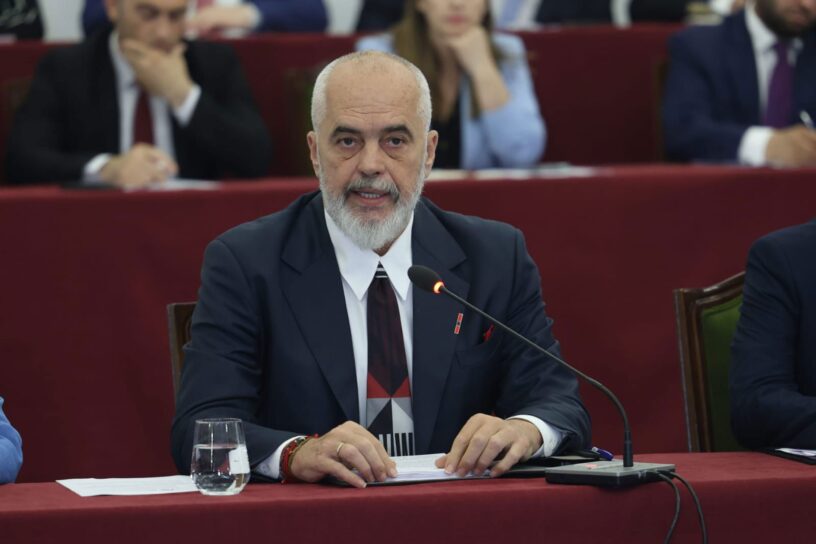Several opposition groups have rejected PM Edi Rama’s invitation for them back a parliamentary commission tasked with undertaking a more systemic fight against corruption, saying Rama has no crerdibility in this field
Some opposition leaders in Albania on Wednesday dismissed Prime Minister Edi Rama’s invitation to collaborate on a parliamentary commission whose mandate will be to fight corruption.
However, Gazmend Bardhi, from the Refoundation Democratic Party, the largest opposition group, left the door open to collaboration without elaborating.
Rama, who is gearing up for next year’s parliamentary elections with the aim of achieving a fourth term that will make him the second-longest serving PM in the country’s history, is facing a divided opposition but is also seeing his government’s reputation sinking lower from multiple corruption scandals.
In a speech that lasted more than two hours on Tuesday, Rama stressed that corruption scandals were not his responsibility and complained about “attempts to poison the public” while claiming he was being “lynched disregarding the facts”.
He dismissed suggestions that he should take moral responsibility for the corruption scandals by resigning as unpractical, claiming Albania doesn’t have the administrative capacity to survive in a political impasse.
At the end of the 13,000-word speech, Rama turned out to business, announcing an initiative for a parliamentary resolution that called for a parliamentary commission for the purpose of fighting corruption.
“My call for all those who are against us is simple […] let’s create a space, […], a common working ground along with allies, […] to identify steps and measures needed to be undertaken,” Rama said.
The resolution, already prepared by his Socialist parliamentary group, calls for a special parliamentary committee that should investigate what needs to be done to fight corruption.
The commission will have a three-year mandate, according to Rama. One purpose of the special commission is “to enhance” parliamentary capabilities to oversee the government and independent institutions for the purpose of fulfilling its constitutional role.
However, critics see the initiative as a thinly veiled attempt to attack the special prosecution, which till now has arrested several dozen officials on corruption charges and further tarnished Rama’s government’s image as systematically corrupt, an allegation that Rama denies.
Enkelejd Alibeaj, an MP from the opposition official Democratic Party, said his party would vote against the resolution. “An anti-corruption initiative proposed by the PM of the most corrupt government in the country’s history is absurd per se,” Alibeaj told journalists.
“They clearly aim to create a control mechanism through a parliamentary commission, that although is presented as ad-hoc, will last for three years,” he added.
Ilir Meta, another leader of the opposition, said Rama has no credibility for anti-corruption reforms. “Nobody expects anything meaningful from him now,” he said.
However, Gazmend Bardhi, head of the Refoundation Democratic Party, the largest opposition group in the parliament, left the door open for compromise.
“Although we believe that Edi Rama will not and could not create a democratic and European state, he will have our contribution,” Bardhi said. Asked by a journalist, Bardhi refused to be more specific.
His group has been part of another compromise with the ruling majority that is viewed with scepticism by many.
A compromise between them released from charges or cut short the sentences of some 100 citizens, among them high-level officials, suspected, charged or sentenced on charges of corruption or abuse of power.
The initiative, part of a larger amnesty that aimed to relive prison overcrowding, has been seen as a wrong signal in the fight against corruption.
However, the US embassy in Tirana responded by calling the initiative “promising”.
“The United States applauds endeavours that builds up on the previous successful reforms … to push forward reforms required for Albania EU and Euro-Atlantic integration,” it noted.
This is not the first initiative in this field. In 2022, a group of experts summoned by the Socialist-controlled Parliamentary Committees of the Laws proposed changes in almost all the laws governing the justice system, proposals deemed “a wrong turn” by EU and US experts.
In 2020, Albania’s Western partners warned against “a backroom deal to kill justice reform”.



